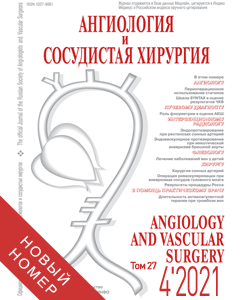Journal «Angiology and Vascular Surgery» •
2019 • VOLUME 25 • №4
Comparison of efficacy of rivaroxaban and warfarin after open operations on the infrainguinal segment
Lysenko E.R., Amirova A.V., Azaryan A.S., Gryaznov O.G., Bushueva E.V.
Federal Clinical Centre of High Medical Technologies of the Federal Medical Biological Agency, Novogorsk, Russia
The authors analysed oral anticoagulant agents prescribed in the postoperative period to patients after endured reconstructive operative intervention on arteries of the femorotibial segment. The study included a total of 104 patients subjected to femoropopliteal or femorotibial bypass grafting using an autologous vein or a prosthesis. Depending on the prescribed anticoagulation agent, the patients were subdivided into two groups. Group One patients (n=43) in the postoperative period received rivaroxaban, and Group Two patients (n=61) took warfarin. Efficacy of therapy was evaluated by the frequency of haemorrhage and thromboses in the early and remote postoperative periods. The findings of the immediate postoperative period demonstrated comparable rates of haemorrhagic complications, early thromboses and redo interventions in both Groups (p=0.7). The duration of long-term postoperative period varied from 3 months to 5 years. No statistically significant differences in patency of the performed reconstructions were revealed between the groups. The 3-year primary assisted patency rate in the rivaroxaban group and warfarin group amounted to 89 and 80%, respectively. The incidence of haemorrhagic complications in the postoperative period was insignificant in the studied groups.
Hence, rivaroxaban may be prescribed in the early and remote postoperative period to patients who underwent open reconstructive operative intervention on arteries of the infrainguinal zone.
KEY WORDS: rivaroxaban, warfarin, arteries of infrainguinal zone, femoropopliteal and femorotibial bypass grafting.
P. 39
ARCHIVES MAGAZINE
2021 (Vol.27)
2020 (Vol.26)
2019 (Vol.25)
2018 (Vol.24)
2017 (Vol.23)
2016 (Vol.22)
2015 (Vol.21)
2014 (Vol.20)
2013 (Vol.19)
2012 (Vol.18)
2011 (Vol.17)
2010 (Vol.16)
2009 (Vol.15)
2008 (Vol.14)
2007 (Vol.13)
2006 (Vol.12)
2005 (Vol.11)
2004 (Vol.10)
2001 (Vol.7)
2000 (Vol.6)
1999 (Vol.5)
1998 (Vol.4)
1997 (Vol.3)


